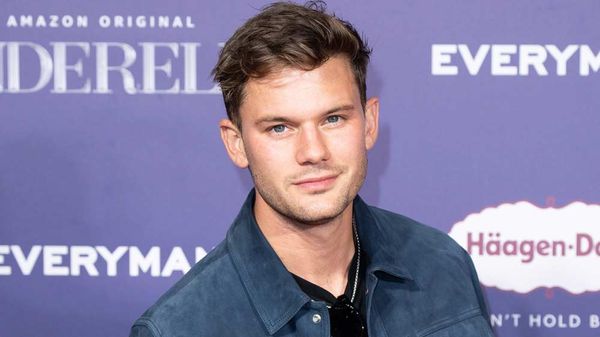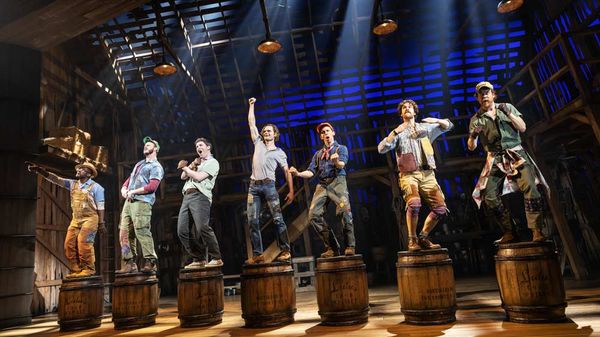May 11, 2008
Change is a-Foothills
Michael Wood READ TIME: 4 MIN.
There's something happening at the Foothills Theatre Company in Worcester. It began with a glittery production in October 2006 of The Rocky Horror Show, the cult classic that had the AARP set doing the Time Warp with the original Hot Tranny Mess, Frank-N-Furter, at the Thursday matinee (yes there's a Thursday matinee).
Rocky Horror marked Russell Garrett's debut as the theatre's new artistic director. His quirky season opener was not a random choice. This is a guy whose conversation is peppered with the phrases "shake it up" and "outside the box."
"I really wanted to sort of announce to the audience and to the city [that] things are a little different now," recalls Garret, who had previously served as the acting artistic director, and acted in and directed Foothills productions.
"People were like, 'Really? You're going to open the season with that?' And I was like, yeah, because it's got name recognition, it's fun, it's a little outside the box and we'll just shake it up a little."
"Shake it up a little" is a bit of an understatement when one considers that in recent years, season openers at Foothills have included Beehive, the candy-coated tribute to '60s girl groups, Forever Plaid, Titanic and Ragtime.
Clearly, under Garrett's direction, the offerings are getting little bit edgier - and a little bit gayer - at the Foothills Theatre, a subterranean space situated in a lonely courtyard between a parking garage and a near-abandoned shopping mall in downtown Worcester. Perhaps that's not surprising given that he's a gay man whose 20-year theater career includes an off-Broadway turn as Miss Texas in the musical Pageant, a role that had him tap dancing in Native American drag and picking off the head of a life-sized cut-out of Ann Miller with a pistol.
In the current season, the company has already staged openly gay playwright Douglas Carter Beane's comedy As Bees in Honey Drown, which features openly gay characters. May 10 brings to the Foothills stage William Finn and James Lapine's Falsettos, the acclaimed musical about a family in turmoil with a gay love story at its heart. On tap for next season is the Tony-winner Take Me Out, the Richard Greenberg drama about a gay pro-baseball player who comes out of the locker. Before Garrett, perhaps the gayest plays produced by the 34-year-old company were Deathtrap and Steel Magnolias.
Nonetheless, Garrett says he doesn't have a gay agenda. "My agenda's mostly just wanting to create diverse programming," he explains. "Because, since we are the only theater like this - and that may change in time - we're it. And so I want during the course of a season for people to get a variety of choices and options. We do eight shows a season and I don't want them all to be comedies and musicals and all be light fluff."
Garrett acknowledges that fluff is easier to sell to audiences, but he's quick to add that limiting the roster to light fare takes too many great works out of the mix. And many of the most interesting works involve gay characters and gay issues. "And let's face it," says the San Diego native. "A lot of great theater was created by gay artists. If you take away the gay quotient, there's not a whole lot left when it comes to theater. Come on!" he says, laughing.
A case in point is the drunken, gay genius Tennessee Williams. Foothills just finished a run of Williams's classic A Streetcar Named Desire. Here again, Garrett sought to "shake it up a little" by hiring Boston Theatre Works founder Jason Southerland to put a few twists on Williams' well-known drama. Under Southerland's direction, the show began with Blanche on the train to New Orleans and imagining what might unfold when she arrived at the home of her sister Stella and her husband Stan.
"There [was] this quite interesting set and lighting and sound design," Garrett explains of the production. "[Blanche is] constantly hearing voices whispering around her. She never [left] the stage in this production, so the actress is always watching and listening in to other people even though she's not - in the text- in the scene."
Southerland's re-imagining of Streetcar was just what Garrett was seeking. Restaging the classics as they were originally done, he says, isn't terribly interesting to him. Southerland, who is also openly gay, "really likes taking classic shows and sort of turning them on their ear a little," Garrett points out.
Garrett's collaboration with Southerland - he also directed last year's Buddy!, the most successful show in the theatre's history - stemmed from his desire to work with local talent whenever possible. This is, after all, regional theatre. "My predecessor wasn't real big on using New England talent," says Garrett, noting that many of the actors came from New York. Aside from the logistics and the added expense of housing out-of-town talent, "I just don't think that serves the purpose of a regional theater," says Garrett.
"I think it's silly not to explore what's right there," he says. "And there's a lot of really good designers, directors and actors here in the area. So I want to use them and I only want to go outside of the box when we can't find what we're looking for."
There he goes again.
Michael Wood is a contributor and Editorial Assistant for EDGE Publications.







